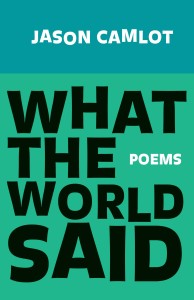How should one appropriately mark and deal with the loss that comes with a death? Montrealer, poet and Concordia professor Jason Camlot’s, latest collection, entitled What The World Said dispenses some words of wisdom:
“Only a fool mourns extravagantly at something so inevitable/ you know it has to happen/ so your feelings should be prepared.”
But things are never so easy, and his attempts at acclimatization form the central motif behind the work, letters thematically arranged around the passing of Camlot’s father.

Throughout, Camlot calls upon his Jewish heritage. After his father’s death, Camlot observed the year-long grieving process as prescribed by Judaism that included daily forays to synagogue and liberal prayers. The insights and imagery that arise from a not-so-religious man trying to celebrate his father and mourn his passing in religious ways is touching and fascinating.
Intrusive minyans, meditations on Gehenna, and Yiddish (and Hebrew) colloquialism pop up throughout, their combined imagery exploring Jewish notions of loss and acceptance — a heavy subject fitting for a people known for bereaved prophets and wailing congregations.
Drawing upon these roots, Camlot’s questioning is more a resigned petition than an interrogation, and for all his reproach to religion, we get the sense he’s going through the motions with an honest heart but can’t receive full comfort or understanding from conventions done out of propriety. There is always a poignant disconnect in the quest to find meaning or comfort in the ritual.
There are a few rough moments in the sea of letters. The more abstract poems, sometimes abundant in numbers and acronyms, are impenetrable. This is understandable — poetry is first and foremost a triage between the poet’s need to speak, a very varied lexicon and an inner world — but seldom comprehensible.
For this reason, the most interesting and playful parts of the book are the ones where Death is squarely confronted. Here, Camlot’s Grim Reaper is taunted, chastised and implored for answers by a narrator who is innocent and naïve, befuddled at Death’s imposing nature but likewise familiar with him as if he was an acquaintance kept at arm’s length. Death is chastened for not receiving letters and for not returning books. Death is told he can’t have dinner. The narrator is annoyed at Death’s lateness for a game of hockey. Death comes off as that one sympathetic guy, who despite himself (or itself), does as he does.
Finally, the book serves as an exposé of how a wordsmith comes to terms with Death — something of interest to readers who may be searching for a way out of grief and writers wanting to explore the technical aspects of it. Though poetry is more free-form than prose, its clever imagery and arrangement is still an enlightening exercise for conventional writers wishing to explore something different.
Camlot’s What The World Said deftly and expertly employs different angles to get at his sadness, but leaves room for wry humour and a strange lightness and playfulness that will be appreciated even by the heartless.
What The World Said is available for sale at chapters.indigo.ca



